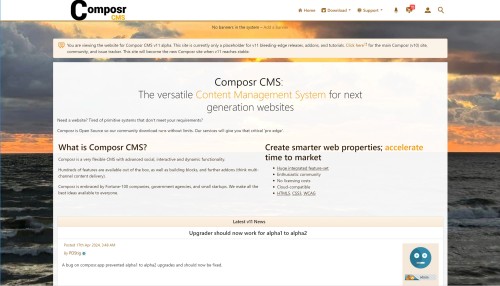Featured Sites: A-Z Index
H
Newest 10 Entries
| Question | How can I improve my search results? |
|---|---|
| Answer | Here are some tips for improving search results:
|
| Question | What is the fast custom index and why should I use it? |
|---|---|
| Answer | The fast custom index is Composr's own search engine, designed to be faster and more efficient than MySQL full-text search, especially for large websites and filtered searches. Benefits of the fast custom index:
Downsides of the fast custom index:
|
| Question | Can I filter my search results? |
|---|---|
| Answer | Yes, you can filter your search results by:
|
| Question | What is the difference between natural and boolean searching? |
|---|---|
| Answer | Natural search is a more relaxed approach where you type in your search terms and Composr tries to find the most relevant results, even if they don't contain all the words. It's like a Google search. Boolean search requires more precision and uses operators like "+", "-", and quotation marks to define exactly what you're looking for. For example, searching for "+car -maintenance" will only return results that contain the word "car" but not "maintenance". |
| Question | How do I search my Composr website? |
|---|---|
| Answer | There are a few ways to search your Composr website:
|
| Question | How do I mark correct answers in a quiz? |
|---|---|
| Answer | For questions with predefined answers, you can mark correct answers by adding [*] after the answer. If no answer is marked correct, the question will require manual marking. You can also use the [UNMARKED] tag after a question to exclude it from scoring. |
| Question | What is the input syntax for quiz questions? |
|---|---|
| Answer | Quiz questions are inputted in blocks, separated by blank lines. The first line is the question, followed by potential answers on subsequent lines. Different question types are indicated by tags after the question, such as [MULTIPLECHOICE], [MULTIMULTIPLE], [LONG], [SHORT], and [SHORT_STRICT]. |
| Question | Can I create complex, multi-screen quiz interfaces in Composr? |
|---|---|
| Answer | While Composr's built-in quiz system is excellent for standard formats, creating intricate multi-screen quizzes might require custom development using Composr's decision tree framework or other programming tools. This allows for highly customized quiz structures and advanced branching logic. |
| Question | How can I analyze quiz results effectively? |
|---|---|
| Answer | Composr enables you to export quiz results to a spreadsheet file, facilitating in-depth data analysis. This is especially useful for manually marked questions, identifying competition winners, and processing data for marketing or research purposes. |
| Question | What are Quiz Sets and how can I use them? |
|---|---|
| Answer | Quiz Sets are a helpful organizational feature in Composr. By prefixing quiz names with "Example: ", you can group related quizzes together. This allows for combined scoring and percentage calculations, particularly beneficial for multi-part questionnaires or tests. |
Top 10 Entries
| Question | How do I restore my Composr website from a backup? |
|---|---|
| Answer | Composr backups come as .tar or .tar.gz files. Extract the archive using an extraction program like 7-zip or your web hosting control panel. To restore a full backup:
To restore incremental backups:
|
| Question | What alternative backup strategies are available? |
|---|---|
| Answer | Many web hosting control panels include built-in backup features that operate at the system level, often offering higher reliability than web-based scripts. Ensure you back up both files and the database. For database backups, you can use tools like phpMyAdmin, which allows you to export your database as a .sql file. |
| Question | How do I create a backup of my Composr website? |
|---|---|
| Answer | Composr offers a built-in backup addon accessible from Admin Zone > Tools > Backups. You can choose between full, incremental, and database-only backups.
The addon allows scheduled backups or manual backup generation. It is recommended to download backups to a location outside your web server for better security. Note: The Composr backup addon is limited by server-side PHP capabilities and might not always be reliable. Consider using alternative backup strategies offered by your web hosting control panel for increased reliability. |
| Question | Why are backups necessary for my Composr website? |
|---|---|
| Answer | Disasters like hard disk failures, data corruption, and unexpected errors can happen at any time. A good backup strategy helps you recover your website and its data in case of such events. Backups can also help you roll back to a previous state if needed, such as after a failed upgrade or accidental changes. |
| Question | How can I control the privacy of member profile fields? |
|---|---|
| Answer | You can control the privacy of member profile fields through the "Member privacy controls" configuration option. If you enable the "Extended privacy option control", you can fine-tune visibility settings for each field. Otherwise, you can set simple access levels (e.g., not at all, to members, to friends, to everyone) for each field. |
| Question | What is the difference between a Composr member and an author? |
|---|---|
| Answer | A member is someone who has created an account on your Composr website and can log in. They have a unique member ID and username, and can interact with the site's features. An author is someone who creates content for the site. They may or may not be a member. For example, you might have an author who submits articles via email but never actually visits or joins the website. |
| Question | What advanced techniques are available for dealing with persistent spammers who repeatedly create new accounts? |
|---|---|
| Answer | Composr's advanced banning features target sophisticated human spammers. Automatic bans can be configured to block users based on specific strings in their posts, while reasoned bans display customized messages to banned users, potentially deterring them. These measures, coupled with the ability to investigate users via IP address analysis, offer robust tools for managing persistent threats. You can configure advanced banning under Admin Zone > Security > Configure advanced banning. |
| Question | How does Composr handle user banning and what options are available? |
|---|---|
| Answer | Composr offers various banning mechanisms. You can ban members by editing their accounts (ban member tick box), preventing logins while still allowing guest access. IP address banning blocks access from specific IP addresses or ranges (Admin Zone > Security > Members > Investigate user to see their IP addresses and flag certain ones for banning). You can also restrict member submissions, or you can effectively "suspend" users by assigning them to a usergroup with minimal privileges (e.g. probation). |
| Question | What is the "Warn Member" form and how can I use it to handle rule violations? |
|---|---|
| Answer | The "Warn Member" form provides a centralized interface for addressing user misconduct. You can issue formal or off-the-book warnings, apply punitive actions like IP bans, usergroup changes, or probation, and even delete content or charge points. This form allows you to document reasons for actions, improving transparency and consistency in moderation. This tool can be accessed on a member's profile as staff, under Audit > Warn member. You can also review their warnings history on their "Standing" tab. |
| Question | How does Composr track user activity? |
|---|---|
| Answer | Composr logs IP addresses for various actions like guest posting, page views, and content submissions. This data helps identify potential spammers and track user behavior. The "Investigate user" module provides tools to analyze IP addresses and gather additional information about suspicious activity. |







